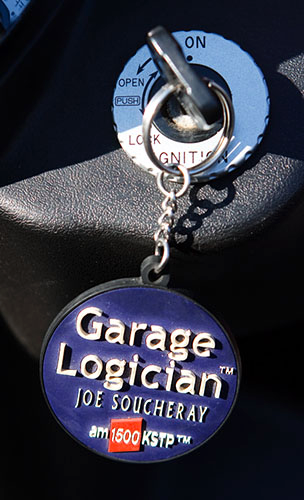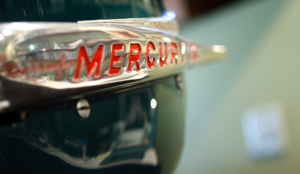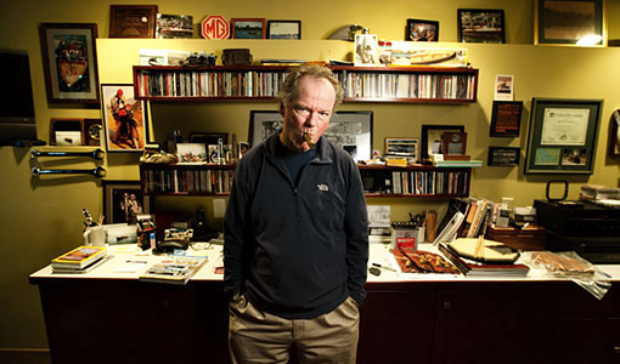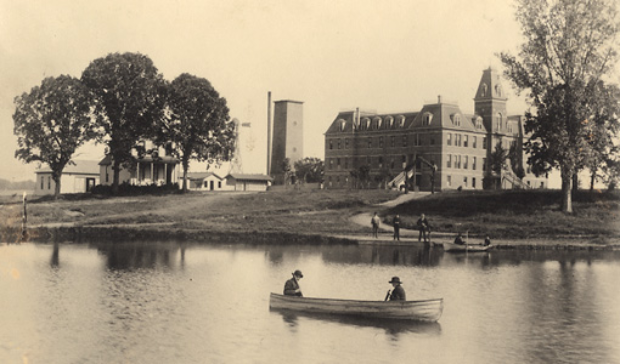How many of you St. Thomas grads remember taking one of those required for graduation courses just to be done with it, all the while thinking, “What good is THIS going to do me?”
Consider the case of one Joe Soucheray. Although today he can’t even remember taking it, records confirm that in the spring of 1968 he completed the then-required “Logical Analysis 111,” or “Logic” as most students back then called this rite of passage to a St. Thomas degree.
Today, the 1971 St. Thomas journalism grad is “mayor” and host of the Midwest’s most-listened-to radio talk show, “Garage Logic.”
Originating in the St. Paul studios of KSTP most weekdays, the three-and-a-half hour program is beamed to listeners via 50,000 clear-channel watts at 1500 on the AM dial, plus another 22 stations that relay it throughout Minnesota, the eastern Dakotas and western Wisconsin.
Today, Soucheray’s brand of logic reaches more listeners in a single afternoon (roughly a quarter-million) than the number of students a philosophy professor could teach in several lifetimes.
According to a St. Thomas course catalog, “Logical Analysis 111” would have given Soucheray “facility with different formal systems for representing and evaluating arguments – including propositional logic, Aristotelian syllogistic, and first-order predicate calculus.”
 While propositional logic is what they talked about in a third-floor classroom of Aquinas Hall, an unofficial Garage Logic Web site puts it like this: “In an effort to pursue the basic logic and common sense which seem to be sadly lacking in modern America, Joe built a virtual city as a vehicle for discussion. … Joe believes that most problems can be solved using the type of discussions that commonly take place in garages. Hence: Garage Logic.”
While propositional logic is what they talked about in a third-floor classroom of Aquinas Hall, an unofficial Garage Logic Web site puts it like this: “In an effort to pursue the basic logic and common sense which seem to be sadly lacking in modern America, Joe built a virtual city as a vehicle for discussion. … Joe believes that most problems can be solved using the type of discussions that commonly take place in garages. Hence: Garage Logic.”
Soucheray didn’t get his start dispensing garage-based wisdom over the radio. The late Father James Whalen, chair of the Journalism Department for many years, put a heavy emphasis on print journalism, and that’s where the mayor got his start.
A rock-and-roll drummer in high school (he still keeps a set of drumsticks on the workbench of his St. Paul home), he started his career writing music reviews for The Aquin student newspaper. He later became a general assignment reporter and editorial writer.
Today, he describes the Joe Soucheray of the late ’60s as “a left-wing, long-haired hippie. Shoot,” he recalls, “I think I even worked on the 1968 Humphrey campaign.”
Maybe not quite that left. Imagine him (in his measured 2008 radio voice) speaking these words penned nearly four decades ago for an Aquin editorial about student unrest in the fall of 1970:
“One may do well to give serious thought to the bombings that have plagued the Twin Cities in recent days and weeks. Unfortunately, it is not irrational to assume that these senseless acts of violence are in the vein of a deep and violent revolutionary pattern.
“It is disturbing then to hear some students praise the destructive forces at work in our society. Let us hope that the majority of students at St. Thomas as well as across the United States will not fail to realize that this bomb squad is far surpassing the absurd theatrical tactics of daily revolutionary characters Jerry Rubin and Abbie Hoffman.”
That was Soucheray’s way of saying, “Hey, you idiots, knock it off.” It was some early garage logic applied to the tumultuous ’60s.
Soucheray landed a sports-writing job at the Star Tribune in Minneapolis in 1973 and in 1980 teamed with Patrick Reusse, then a sports writer at the St. Paul Pioneer Press, to host KSTP Radio’s “Monday Night Sports Talk.”
"Holy cripes, did I have to come up with more than 11,000 ideas?"
More often than not the show had nothing to do with sports. Listeners found great humor in a wacky parade of callers, like the addled character who often called just to say two words: “orange pop.” Always popular around the holidays was the musical train wreck of middle-age guys with genuinely horrible singing voices attempting to see how far they could plow into classic Christmas songs before mangling and forgetting the lyrics.
That’s when listeners got their first taste of what Soucheray calls “the duck thing.” It’s an unusual and uncontrollable laugh that begins normal enough but ends in a series of distinct duck-like sounds. His record is something like 30 uninterrupted quacks. “I can’t help it,” he says, “it just happens.”
Soucheray and Reusse switched papers, but their radio show continued. It later moved to Saturday mornings, and today they proudly proclaim it to be the “longest-running sports talk show in history.” No one seems to complain when it has little to do with sports.Soucheray elected himself mayor of Garage Logic and launched a daily radio show by the same name in 1993, nine years after he began his 25-year stint as general columnist for the Pioneer Press.
Sitting in his garage one day, using an unlit Hoyo DeMonterrey cigar to calculate numbers in the air above his head, Soucheray figured out that over the years he has hosted or co-hosted 5,550 radio programs and has written 5,500 newspaper columns.
 “Holy cripes, did I have to come up with more than 11,000 ideas?” he wondered. Soucheray remembers a conversation with one of his Pioneer Press editors, Walker Lundy, who asked him, “Do you know how lucky you are to work at a paper that lets you do radio?”
“Holy cripes, did I have to come up with more than 11,000 ideas?” he wondered. Soucheray remembers a conversation with one of his Pioneer Press editors, Walker Lundy, who asked him, “Do you know how lucky you are to work at a paper that lets you do radio?”
“I fired back, ‘Do you know how lucky you are to have a guy who works at a radio station that lets him write for the paper?’ I guess that’s around the time it finally settled into my brain that I’m mostly a radio guy.”Like many St. Thomas journalism grads of the Whalen era, Soucheray thinks often of his mentor and teacher.
“We didn’t talk about radio much when I was in college,” he said. “But I was taught well by the guy. I bring to the show an effort to be factual, and I am loyal to the principles of journalism as Father Whalen taught them to me. I’m extremely loyal. As an example, we have the only radio show in the world with a button we push and the announcer says, ‘We don’t know that.’ That was a ‘Sports Talk’ invention.”
Soucheray would be the first to tell you, “No, I’m sure not on the left,” but also maintains that “Garage Logic” is not essentially a political show: “The things we talk about are observations of life. But we’ve found that GL is enjoyed by those people who tend not to be on the left. It’s not more complicated than that.
“People from the left enjoy the show, too. I don’t set out to attract hard-core right-wing callers, and I don’t go on the air with Republican talking points. ‘Garage Logic’ is better than that; ours is more of a lifestyle show.”
 He smiled when he said “lifestyle,” probably because if a caller to GL used that word, Soucheray would push a button on his console and give it the deep and dreaded “foghorn.” For those unfamiliar with “Garage Logic” logic, “lifestyle” is a term more closely aligned with “Euphorians” than with the citizens of Garage Logic. Euphorian? That’s code for a liberal, or worse. Euphorians are humorously yet regularly hammered on the program, as is the mythical town of Euphoria, which isn’t all that far from the town of Garage Logic, the seat of Gumption County and just down the road from Diversityville.
He smiled when he said “lifestyle,” probably because if a caller to GL used that word, Soucheray would push a button on his console and give it the deep and dreaded “foghorn.” For those unfamiliar with “Garage Logic” logic, “lifestyle” is a term more closely aligned with “Euphorians” than with the citizens of Garage Logic. Euphorian? That’s code for a liberal, or worse. Euphorians are humorously yet regularly hammered on the program, as is the mythical town of Euphoria, which isn’t all that far from the town of Garage Logic, the seat of Gumption County and just down the road from Diversityville.
As Soucheray explains on his KSTP Web page, Garage Logic is a place “where common sense prevails, the two-car garage is revered and cigar smoking is allowed (and lawyers aren’t.)”“GLers want to see kids wearing a helmet while riding a bike,” he says. “Euphorians want to see them wearing a helmet while bird watching.”
Euphorians are useful for at least something: they help define “The Mystery,” a central and recurring GL theme. This mystery, Soucheray explains, has to do with bringing about a different kind of America. “We are inventing mechanisms to alleviate the struggle to achieve,” he said. “I think the mystery has to do with bringing about equal outcomes; however, I see equal opportunities. I see the move to replace equal opportunities with equal outcomes as profoundly wrong.”
Culture-war students would place Soucheray’s newspaper column to the right of the conservative-liberal divide and “Garage Logic” even farther to the right. “I’m a guy in search of what used to be called Republican,” he says, “small government and low taxes.”
And then there’s inflection, an advantage enjoyed by Soucheray the radio guy over Soucheray the newspaper guy. When you hear one of the mayor’s best-known retorts, “more proof of global warming” (dispensed after untold thousands of radio weather reports) there’s little doubt where Soucheray stands on the matter.
“In order to believe that driving a motorcycle or car adds to climate change, you have to say that humans are bigger than nature,” he said in a late-fall interview in his garage, surrounded by two cars, 10 motorcycles and a stunning, 10-horsepower 1954 Mercury outboard motor. “We are gnats on the hide of an elephant when it comes to us affecting the climate. I wish I could live long enough to see this thing disproved. This is utter nonsense and in reality nothing but cover for a new way of governing.”
"In order to believe that driving a motorcycle or car adds to climate change, you have to say that humans are bigger than nature"
Some might think this garage business is so much marketing fluff. Not at all. Soucheray truly loves his garage, and it’s a thing to behold. He’s content there. It’s got the fridge, and even a small, er, men’s room. It’s got some sturdy stools and chairs for sitting around and discussing things like the 50-50-90 rule, a term Garage Logicians understand to mean that if the husband has a 50-50 chance of being right, there’s a 90 percent chance he’ll be wrong.
Then there’s a flat-screen TV, a box of cigars (mostly chewed, rarely smoked) and a radio (which he hardly listens to, much preferring rock ’n’ roll CDs). There’s a stash of flashlights (in addition to being the mayor, he also is known as The Flashlight King).He’s got just enough tools for “goin’ in,” a GL term for digging into a repair or remodeling project that becomes miserably complicated.
Most of all, he’s got motors with cylinders. In the world of GL, a person’s worth is measured by one’s “C.I.” or cylinder index. The goal is to have as many internal combustion cylinders as your age. The mayor is holding his own; he’s got exactly one more cylinder than his age of 59.
A former collector and restorer of antique boats (one of the halfdozen books he’s written is Waterline: Of Fathers, Sons and Boats), Soucheray now restores and collects older motorcycles. He not only rides a substantial Harley Davidson Dyna Super Glide but also putts around on something any self-respecting Euphorian would drool over, a shrimpy 125 cc Yamaha motor scooter that gets 77.7 miles to the gallon.
It’s a busy life: columns to write, radio shows to prep, a garage to oversee, and being Dad in a close-knit family of three kids raised with his wife of 37 years, Jennifer (she’s never called that on the show or in the newspaper column; she’s known to the outside world as “the C.P.,” or chief procurer).
Still a handful of years from retirement, he’s not sure what that will look like. “I’m not anticipating anything that remotely resembles a conventional retirement. I’m really lousy at doing nothing.”
About the author
Jim Winterer was a journalism classmate of Joe Soucheray, and they probably spent too much time playing pingpong together in the basement of Murray Hall. Neither can remember the name of the speaker at their May 1971 graduation; both, however, recall it was muggy and the talk was boring. Winterer has been director of the St. Thomas News Service since 1980.





